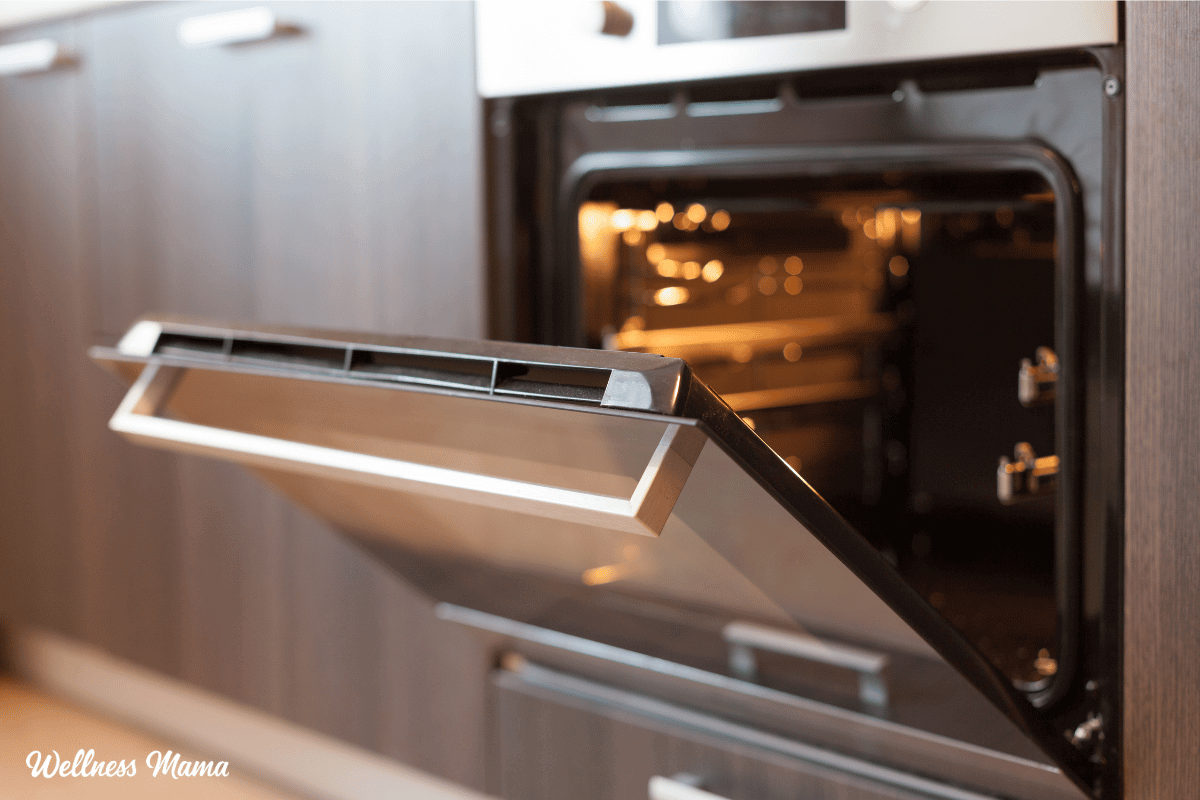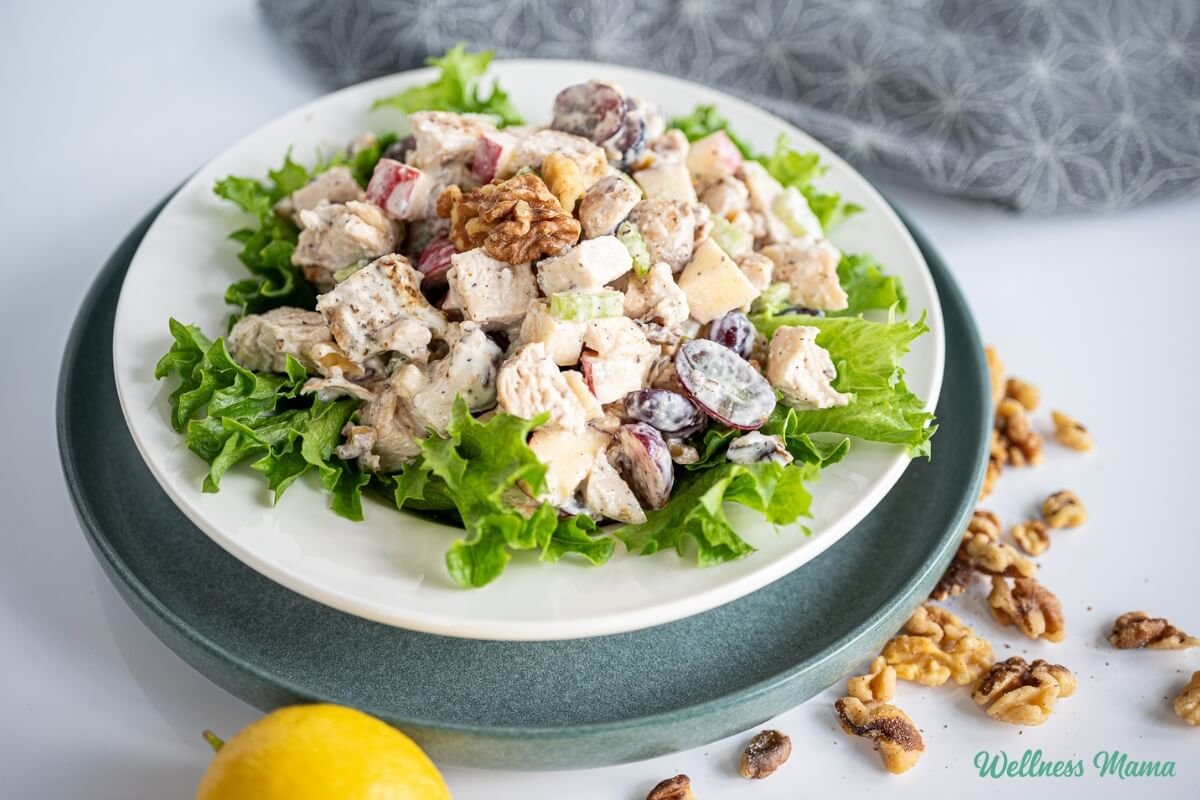Oven cleaning stinks, quite literally! It’s time consuming and commercial oven cleaners are toxic. I also don’t feel like scrubbing stubborn spots and buildup for ages with wimpy cleaners. When I switched from conventional cleaners to natural ones figuring out how to clean the oven was at the top of my list.
I don’t have a self-cleaning oven (which may be a good thing) so I had to find an easy, non-toxic cleaning method. Here’s how to clean your oven from top to bottom with DIY cleaners. Plus cleaning tips for those who want something even faster and easier!
How to Clean an Oven the Natural Way
If you’re like me, your oven occasionally (or often, in my case) gets burnt-on food inside of the oven. Then there are the splatters on the sides, stubborn stains, and grease on the oven door glass.
My oven doesn’t have a self-cleaning function like some. Having to wipe down the oven for an hour with old-fashioned elbow grease while sticking half of my body in a grimy kitchen appliance didn’t sound appealing either.
A self-cleaning option is one way to solve this problem, but I’ve read that the high heat self-cleaning feature may cause elements to burn out faster. The oven reaches about 900 degrees Fahrenheit during a self-cleaning cycle and the high temperatures can cause other issues. Ovens off gas deadly carbon monoxide when self-cleaning but it’s unclear how much. Enough for experts to recommend airing out the room or leaving the house while you do it!
Another option is to steam clean with warm water. The idea is the hot water softens grime so you can wipe it off. While this can work for smaller messes, it does require a lot of scraping and cleaning.
So, for now, my oven is self-cleaned… by me!
Natural Oven Cleaner: Methods of Attack
It’s easy to ignore a dirty oven. Just close the oven door and pretend it’s not there (unlike my sink of dirty dishes… ahem). Eventually, all the baked on food leads to a smoky oven! I looked at the store’s heavy-duty oven-cleaning products and wasn’t impressed. They promised easy-off messes but at the cost of lung burning toxins. Not something I want in my oven or around our food!
Thankfully, there are several ways to clean an oven without harsh chemicals or a lot of scrubbing. I tried a few natural options before finding a great oven cleaner: baking soda!
How to Clean An Oven
Once you have the right cleaners, cleaning your oven is fairly easy. There are a few steps if you want to do a thorough, top to bottom cleaning session. Here’s how to do it!
Clean Oven Racks
While you’re cleaning your oven, don’t forget about the oven racks. If yours aren’t too bad then spray with some cleaning solution and wipe down with a damp cloth (more on my favorite cleaner below!). For tougher messes, try an overnight soak in warm water and dish detergent in the bathtub. After soaking, use homemade scouring powder and dish soap to clean.
Clean the Outside Door
The inside of the oven door accumulates baked on grease and food, but the outside also gets dirty. It’s important to avoid harsh cleaners, scrubs, steel wool, or other abrasives on the exterior. These can damage the surface and cause scuffs and scratches.
Soapy water and a damp cloth work well. If your oven is stainless steel, then a non-toxic stainless steel cleaner or diluted vinegar are good options. A homemade glass cleaner also works great on most oven exteriors.
Clean the Stovetop
Next to the oven, this may be my least favorite surface to clean. First, make sure that the stovetop surface is cool. It also helps to wipe up any messes or spills with vinegar right after they happen. With little kids and a million things to juggle though sometimes that can be tough!
- If you have a flat-top glass electric stovetop these require special treatment. Gentle options like a little dish soap in warm water can work. For stuck-on messes use a plastic scraper (an old credit card can work). Try soaking a cloth in diluted vinegar and laying it on top of stuck food for a few hours. This helps soften the mess so it can easily be wiped up. Some sources also recommend making a paste with water and baking soda on a soft cloth to clean glass stove tops.
- For a gas range, start by soaking the burners and grates in some soapy water in the sink. If you have uncoated cast iron grates then do not soak, as they’ll rust. If you have an older style electric stove, also remove and soak the drip pans underneath the burner coils.
- Next, thoroughly wipe down the stove top with soapy water or an all-purpose cleaner. If using soap, follow this up by wiping with some vinegar to remove any soap residue. For stuck on pieces, try the wet cloth method mentioned above.
- Scrub down the coated grates in the sink with some baking soda or soapy water.
How to Clean Inside of the Oven
First, remove any cookware or racks in the oven. I’ve found two different cleaners that work really well for inside the oven.
How to Clean an Oven With Baking Soda
It seems like a simple fix, but baking soda paste is a quick and easy way to eat away oven grime. Baking soda helps make the daunting task of oven cleaning a little easier. Here’s all you need (really!):
Supplies
- spray bottle with water
- baking soda
All I have to do to get a shining oven is spray the oven down with a water bottle so that it’s damp. Then I’ll sprinkle baking soda in a thick layer on the bottom of the oven. You can also make a paste with baking soda and water then use a soft brush or cloth to coat the bottom and sides of the oven. Be sure to avoid getting it on any heating elements.
Here’s the process step by step:
Instructions
- Spray the interior of the oven with water, making sure it’s evenly damp. Pour about a 1/4 inch layer of baking soda on the bottom of the oven. If you see any dry spots, mist it with the water bottle until it resembles a paste.
- OR mix baking soda and water in a bowl to form a loose paste. Coat the bottom and sides of the oven with this mixture.
- Leave the paste on for several hours, preferably overnight. Keep the oven off, unless you want to see some amateur special effects… I don’t recommend this!
- Wipe up the paste with a cloth or an old towel. All the grime will come with it!
- For really baked-on grime, this may take a few applications.
Note: It’s important to ensure any residue has been completely removed before using the oven. Any remaining baking soda may smoke if left in contact with the heating element!
Some people suggest spraying down the oven with some white vinegar or lemon juice as a last step to make it easier to clean out the oven. However, I don’t usually find this necessary.
Option 2: Branch Basics
The baking soda method was one of my first natural cleaning discoveries, but since then I found another option I like even better!
It’s called Branch Basics and be warned… gushing will follow as I am addicted to their products. I’d heard of these cleaners for a long time before trying them (skeptic that I am). I’m fond of my thrifty homemade cleaners and I doubted it could possibly be as good as other people said it was. Branch Basics is a cleaning concentrate that you can use for almost everything.
Turns out, it isn’t as good… it’s better! I feel silly for waiting so long to try it.
Here’s the story:
The Great Oven Explosion
It all started when I had to cook for a big group and I had a lot of potatoes in the oven. In my haste, I’d forgotten to poke them with a fork and several potatoes had exploded, Of course, all the sweet potatoes dropped their sticky mess all over the oven racks and bottom.
It was a smoky, awful mess. It was also bad because this was just before Thanksgiving company came and I needed my oven fully functional ASAP. The baking soda method wouldn’t work since it took several hours if not overnight to work.
I decided to put my new Branch Basics to the test… I figured if it could clean that oven it could do anything!
The Big Reveal…
I made a concentrated mixture of the Branch Basics concentrate and sprayed it on the oven. I watched in amazement as the cooked-on junk melted off the sides and bottom. After a quick wipe with a brush and some microfiber cloths and it looked like a brand-new oven! It definitely beat the baking soda method.
A DIY Diva Gives In…
After that, you’d better believe I bought a 5-gallon pail of their concentrate that will last for years.
If like me you could use something that makes cleaning a little easier and more enjoyable, Branch Basics has a discount for Wellness Mama readers. Use the code WELLNESSMAMA at this link for 15% off a starter kit for first-time customers.
I’ll admit that I don’t pull out my DIY cleaners as much anymore now that I have natural, pre-made ones that work. Who doesn’t need a little shortcut now and then? Plus, Branch Basics was started by a mom who needed natural and safe cleaning solutions. (Sounds familiar!) Hear the story in this Wellness Mama podcast.
How do you clean your oven without harsh chemicals? Have you found a natural oven cleaner that works for you? Share your tips below!



